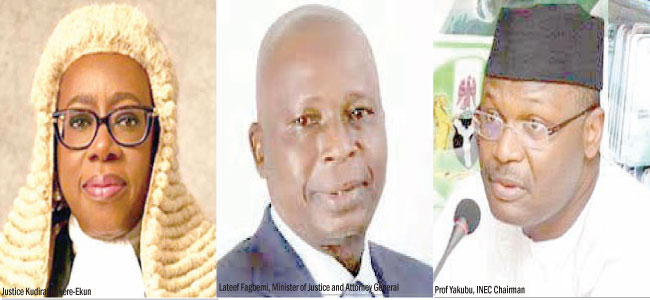
As aggrieved parties in last Saturday’s off-cycle gubernatorial election express their willingness to contest the results before a competent election petition tribunal, YEJIDE GBENGA-OGUNDARE, in this report, examines the process of election petition in Nigeria; the laws governing how elections are conducted, and how the results can be challenged under the provisions of the 1999 Constitution (as amended) and the Electoral Act 2022.
Last Saturday, the Independent National Electoral Commission (INEC), conducted off-cycle election in Edo State to elect a new governor for the period of four years. Off-cycle elections are elections that occur outside the regular election cycle. And currently, eight states run on off-cycle elections for their governorship elections. They include; Bayelsa, Imo, Kogi, Osun, Ondo, Ekiti and Anambra.

Reasons for off-cycle election include death or resignation, judicial nullification, election disruptions, recall, that is, a process that allows citizens to remove an elected representative from office before their tenure expires following legal procedure and inconclusive election due to electoral malpractice, violence or any other unforeseen circumstance. Because of those reasons, Independent National Electoral Commission (INEC) may schedule an election at a later date to conduct it.
For Edo State, election was conducted off-cycle since 2008 after Adams Oshiomhole’s legal victory overturned the results of the 2007 general election. And while elections are essential for democracy, off-cycle elections come with their own set of challenges like low voter turnout due to voter fatigue, the financial burden and additional costs, such as funding for the Independent National Electoral Commission (INEC) and logistical expenses for security and polling arrangements.
However, the process is the same and the fallout is usually similar; when elections are held, most times the dissatisfied parties go to court for the final determination of who the winner is, by filing an election petition. In an election petition, the court looks at the facts of every case brought before it and makes a decision. If evidence before it shows who the real winner is, such a person is declared the winner. However, the winner cannot always be ascertained by those facts. In such a case, the court will order another election to be conducted to determine a clear winner. This kind of election is called a run-off election.
INEC had announced that Okpebholo polled 291,667 votes to defeat PDP’s Asue Ighodalo, who came second with 247,274 votes and Labour Party’s Olumide Akpata, who emerged third with 22, 763 votes.
Adamawa State Governor, Ahmadu Fintiri, who is the Chairman, Edo State Governorship Election National Campaign Council, on Sunday, stated that the Independent National Electoral Commission should be held accountable for violating the Electoral Act.
In a statement, PDP’s National Publicity Secretary Debo Ologunagba said: “The Peoples Democratic Party stands by the results of the Edo State Governorship election as garnered by its polling agents across the state and echoed by the Chairman of the Edo PDP National Campaign Council, Governor Ahmadu Fintiri of Adamawa State, which indicate that the PDP candidate, Dr. Asue Ighodalo, clearly won the election.
“The PDP asserts that the rush, venom, and hauling of insults with which the All Progressives Congress attacked Governor Fintiri only confirms APC’s violent desperation to cover its manipulations and steal the mandate freely given to Dr. Asue Ighodalo by the people of Edo State as reflected in the genuine votes cast at the Polling Units.
“As Governor Fintiri presented, the results collated from the Polling Units have Asue Ighodalo in a clear lead before the state collation exercise was hijacked by the APC, which, in connivance of some unscrupulous INEC and security officials, engaged in blatant alteration and substitution of the genuine results with fabricated figures in favour of the defeated APC candidate.”
The PDP Governors Forum, led by Bauchi State Governor, Bala Mohammed, said at INEC must live up to the expectations of the people as an “impartial umpire.”
The candidate of the People’s Democratic Party, Asue Ighodalo, in a statement he issued on Monday, a day after the Independent National Electoral Commission, INEC, declared the candidate of the All Progressives Congress, APC, Senator Monday Okpebholo, winner of the Edo election, claimed that his mandate was stolen by people who do not mean well for the state.
In his first reaction to the outcome of Saturday’s governorship election in Edo State, Candidate of the Labour Party, Mr. Olumide Akpata, has said that what transpired on 21 September was not an election but a transaction.
In a release titled, “Unbowed, Unbent, And Unbroken: Statement On The 2024 Edo State Gubernatorial Election Results”, Akpata said with the announcement of the results and the declaration of a governor-elect by INEC, he found himself compelled to “issue this statement with a mixture of profound concern and unwavering hope for our future.”
He said: “While preparing for this election, we harboured grave concerns about the integrity of the process. We anticipated that powerful forces would attempt to skew the outcome in their favour, regardless of the will of the people.
“Regrettably, these fears have materialised. Yet, we must also confront an uncomfortable truth: the outcome was enabled not just by those who sought to manipulate the process, but also by the actions—and inactions—of a significant portion of our electorate.”
Akpata noted that although the election was largely free from historical forms of election-day malpractice such as ballot box snatching and stuffing, it was nevertheless marred by voter intimidation and the falsification of results.
Following Saturday’s exercise, parties are already expressing dissatisfaction after the declaration of Senator Monday Okpebholo of the All Progressives Congress (APC) as the Governor-elect. And in the likelihood of aggrieved parties going to the tribunal, many people have again started discussing the legal process for how elections are conducted and how election petitions are resolved.
Election tribunal formation
People involved in an election petition referred to as parties are those that can bring an election petition case or can defend one. They key parties are the contestants, the political parties and INEC, which must always be included as a respondent to an election petition.
There are two types of Election Petition Tribunals; State Election Petition Tribunals and the Governorship election tribunal. As set out in the 1999 Constitution, there are two types of election tribunal for each state of the federation which are vested with original jurisdiction over the trial of election petitions. The first is the National and State Houses of Assembly Election Tribunals that have original and exclusive jurisdiction to deal with the petition from the Federal House of Representatives elections, senate elections and state Houses of Assembly.
The second type is the Governorship election tribunal which is vested with exclusive original jurisdiction to hear and determine petitions for Governorship elections. Tribunals are composed of three members made up of the chairman who shall be a judge of the High Court and two other members appointed from the ranks of judges of the high court, Kadis of Shari’ah Court of Appeal, judges of the customary Court of Appeal or other members of the judiciary that are not below the rank of a Chief Magistrate.
The Court of Appeal is vested with the powers to hear appeals from election tribunals in respect of the National and State Houses of Assembly Election Petitions and its decision is final in that regard. However, petitions arising from the Governorship elections enjoy two Appeals: first at the Court of Appeal and finally at the Supreme Court of Nigeria.
Grounds to challenge an election
After an election, any individual that contested or the political parties can challenge the results. And they can do this premised on certain allegations; a person whose election is questioned was at the time of the election not qualified to contest the election, the election was invalid by reason of corrupt practices or noncompliance with the provisions of the Electoral Act or the respondent was not duly elected by majority of lawful votes cast at the election.
There are three main outcomes that can be the end result of an election petition; the tribunal can uphold the election, the tribunal can nullify the election and order a new election or the final one is that the tribunal can reject the election decision and the person who won the election is removed and the petitioner is installed as the winner.
How election petitions work under the 2022 Electoral Act.
Based on the provisions of Section 133 of the Electoral Act 2022 which states that an election petition may be presented by one or more of the following persons; a candidate in an election or a political party which participated in the election, any of the candidates that participated in Saturday’s off-cycle election and their parties can file a challenge before the tribunal.
It takes the following steps:
Gathering Information; An election petition is a detailed and fact-based process which requires the petitioner to not only state the grounds for the challenge, but to also provide evidence of this. In most cases, the petitioner does not have the evidence, and would need to get it from INEC, and so in the early stages before a petition is filed, you would see the potential challenger file a motion to get the evidence. Once you have access to the information and you have been able to ascertain the facts to build your case, then you can move o to the next stage.
Filing the Petition: The Petition needs to be filed within 21 days of the election, after which the person seeking to challenge the petition will be out of time, and unable to proceed. After the petition is filed the respondent (both the winner of the election and INEC) have 21 days to respond to the petition with their own position and their own side (with facts to back it up). If the response brings up any new facts, then the petitioner has 5 days to respond.
Pre-hearing session: After the documents are all served on the relevant parties, the petitioner is then meant to apply to the tribunal for the issuance of a pre-hearing notice. The pre-hearing is essentially that stage where all the preliminary issues are discussed, and things like witness lists, dates of the hearing, etc are finalised. This stage is not meant to take more than 14 days.
Hearing of the Petition: This is where all the issues are litigated. The Tribunal will receive documentary evidence, but also take oral testimony. The petitioners and the respondents will all present their cases, and the tribunal will hand down judgment. At the conclusion of the hearing, the Tribunal shall determine whether a person whose election or return is complained of or any other person, and what person, was validly returned or elected, or whether the election was void, and shall certify the determination to the Resident Electoral Commissioner or the Commission.
If the Court has determined that the election is invalid, then, and new election is ordered, then this shall be held by the Commission not later than three months from the date of the judgment.
Appeal: If either of the parties is unsatisfied with the judgment of the tribunal, then they can appeal to the Supreme Court. This is the highest appellate body, and their decision on the appeal is final.
READ ALSO: Maiduguri: BUA Group donates N2bn to support flood victims







